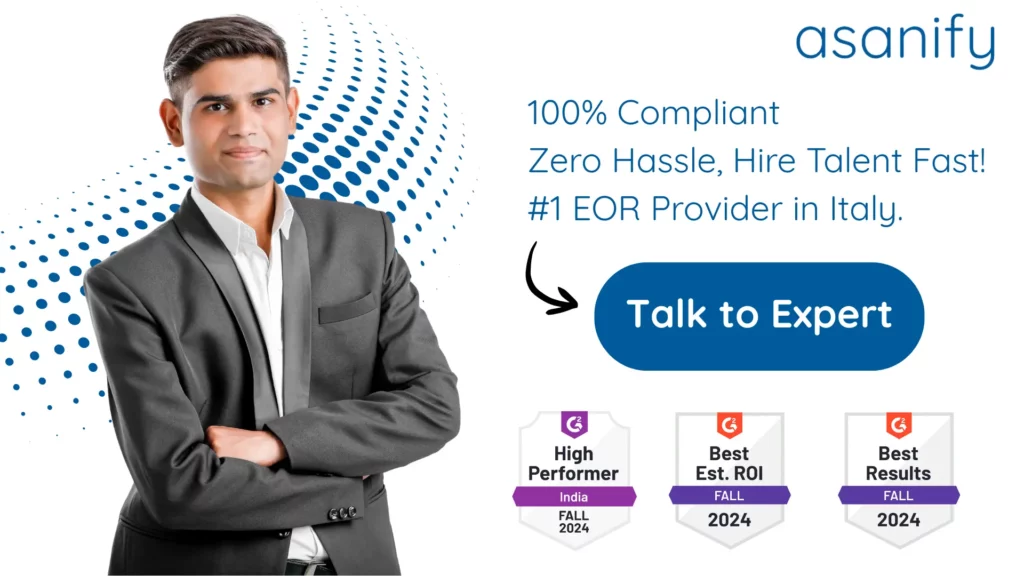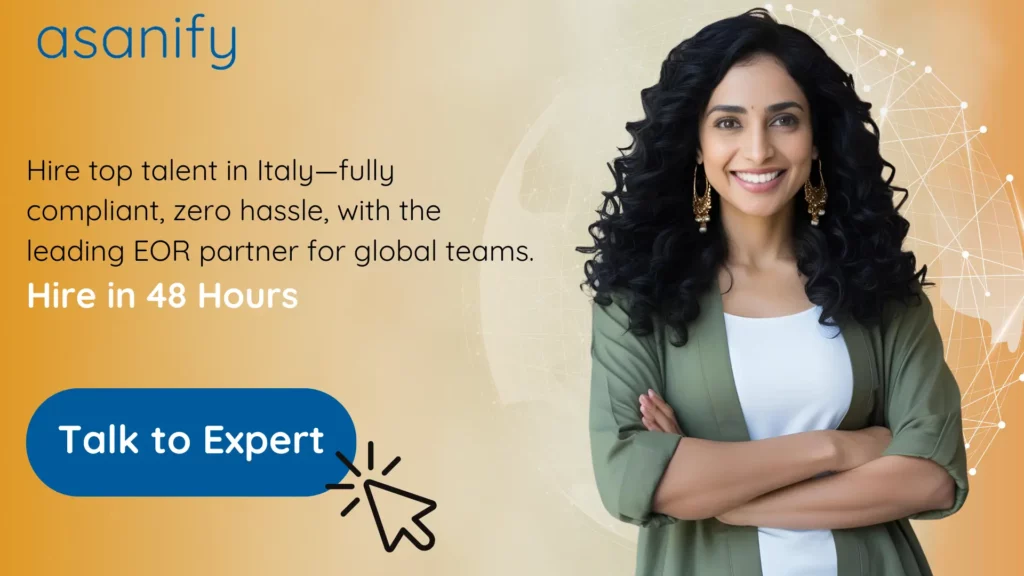In 2025, global companies are turning to staff augmentation as a fast, flexible way to build teams—without the overhead of setting up a local entity. Italy has become a top destination for this model, offering access to skilled, multilingual talent, strong EU compliance, and competitive costs.
From tech startups to global enterprises, businesses are tapping into Italy’s workforce for roles in IT, engineering, design, and more. In this guide, we highlight the top 10 staff augmentation companies in Italy that can help you scale efficiently and stay fully compliant.
Table of Contents
- What is Staff Augmentation and Why is Italy a Strategic Hiring Destination?
- Staff Augmentation Models Commonly Used in Italy
- Benefits and Challenges of Staff Augmentation in Italy
- How to Choose the Right Staff Augmentation Partner in Italy
- Top 10 Staff Augmentation Companies in Italy
- Legal and Compliance Considerations in Italy
- How Asanify Can Help You Hire in Italy
- FAQs
What is Staff Augmentation and Why is Italy a Strategic Hiring Destination?
Staff augmentation allows businesses to temporarily extend their in-house workforce by bringing in external professionals, offering flexibility and speed without the commitment of permanent employment. In 2025, it has become a preferred model for companies worldwide needing project-based talent or specialized skills without establishing a legal entity.
Why Italy?
Italy’s staff augmentation appeal lies in its blend of technical talent, EU-aligned labor laws, cost-effectiveness (compared to Western Europe), and cultural compatibility with global businesses.
Key Advantages:
- Educated, Multilingual Workforce: Strong university pipeline with English-speaking talent across tech, finance, and engineering.
- Affordable Yet Skilled Talent: Competitive rates compared to Germany or France, with high-quality outcomes.
- Central European Time Zone (CET): Ideal for collaboration with teams across Europe and North America.
- Innovation Ecosystem: Tech hubs like Milan, Rome, and Turin foster a startup and engineering-friendly ecosystem.
Staff Augmentation Models Commonly Used in Italy
Italy offers a wide range of staff augmentation models tailored to fit varying business needs, project scopes, and risk appetites. Whether you’re a startup looking to test the waters with short-term technical help or a multinational aiming to scale your team with long-term contributors, the Italian market supports multiple engagement formats that deliver both flexibility and compliance.
Onsite, Nearshore, and Offshore Models
Each of these models offers distinct benefits depending on how closely integrated you want your augmented staff to be with your core team.
Onsite Staff Augmentation
This model involves hiring professionals who work directly from your physical office or co-located facilities in Italy. It’s ideal for companies that already have a legal presence in Italy or operate in industries where hands-on collaboration is critical—such as manufacturing, R&D, or enterprise IT implementations.
Benefits include:
- Direct face-to-face collaboration
- Easier team integration
- Alignment with Italian business norms and work culture
However, this model typically comes with higher costs, including workspace, travel reimbursements, and local tax compliance.
Nearshore Staff Augmentation
Nearshoring involves hiring talent from nearby EU countries like Romania, Croatia, Poland, or Spain. This model provides a great balance between cost-efficiency and geographical or time zone alignment.
Advantages:
- Similar EU labor regulations and legal frameworks
- Overlapping working hours for seamless collaboration
- Cultural proximity and multilingual talent pools
Nearshoring is well-suited for companies operating across multiple EU locations who require both technical capabilities and frequent synchronous communication.
Offshore Staff Augmentation
This model taps into global talent markets in regions such as South Asia, Latin America, or Southeast Europe. Offshore augmentation is the most budget-friendly option and is widely used for development, QA, support, and data services.
Considerations:
- Greater cost savings but potential challenges with time zones
- Requires stronger remote communication protocols
- Must ensure GDPR compliance and proper IP protections
Companies often combine offshore models with onsite leads or nearshore coordinators to create hybrid team structures.
Dedicated Teams vs. Individual Contributors
Your choice between hiring an entire team or individual experts will largely depend on the project’s size, complexity, and duration.
Dedicated Teams
This model provides a full, cross-functional unit—including developers, designers, QA engineers, DevOps specialists, and project managers—that functions as an extension of your internal workforce. Dedicated teams are best for large-scale initiatives such as platform development, enterprise transformation, or multi-phase product launches.
Benefits:
- Seamless integration with your internal processes
- Consistent team dynamics and accountability
- Ideal for long-term strategic goals
These teams typically follow agile methodologies, attend your sprint meetings, and align with your KPIs and release cycles.
Individual Contributors
Sometimes you only need to fill a specific skill gap—like a data architect, SAP consultant, or AI engineer. In such cases, hiring individual contributors makes sense, especially for short-term needs or niche expertise.
Use cases include:
- Temporary coverage for team absences
- Specialized roles during product spikes or compliance audits
- Early-stage startups testing a product idea
Italy has a strong base of high-quality freelancers and consultants across industries to support such focused engagements.
Short-Term, Long-Term, and Contract-to-Hire Engagements
Choosing the right contract length ensures that your hiring strategy aligns with your business goals.
Short-Term Contracts (1–6 months)
Ideal for time-sensitive or one-off projects, short-term staff augmentation is typically used for:
- MVP development
- System migrations
- Cybersecurity audits
- Software updates or compliance assessments
This model helps companies respond quickly to urgent project demands without any long-term commitments.
Long-Term Contracts (6–24 months)
Longer engagements are suitable for ongoing product development, infrastructure modernization, or support for newly launched operations in Italy.
Best suited for:
- Companies expanding into new markets
- Enterprises with continuous delivery pipelines
- Teams requiring deep product knowledge and continuity
Most staff augmentation providers in Italy support rolling contracts, auto-renewals, and optional transition to permanent roles.
Contract-to-Hire
This hybrid model lets companies evaluate a candidate’s performance, cultural fit, and technical ability before extending a permanent offer.
Advantages:
- Lowers the risk of bad hires
- Enables smoother transitions to in-house teams
- Offers more flexibility in budget and resource planning
It’s especially popular among fast-growing startups or mid-sized businesses unsure about long-term headcount planning but wanting to retain top talent post-project.
Together, these staff augmentation models provide Italian and international businesses with the flexibility to scale their workforce based on real-time business needs—while staying compliant with EU laws and optimizing operational costs.

Benefits and Challenges of Staff Augmentation in Italy
Staff augmentation in Italy offers global companies quick access to highly skilled, EU-compliant professionals without the need to establish a local entity. It enables flexible scaling, cost optimization, and faster time-to-hire across tech, design, and business functions. However, navigating Italy’s complex labor laws, high social contributions, and misclassification risks requires careful planning or the support of a compliant partner.
Benefits
- Quick access to top Italian and EU talent
- EU compliance readiness (GDPR, IP protection)
- Reduced time-to-hire (typically within 10–14 business days)
- No legal entity needed when using an EOR or augmentation firm
Challenges
- Higher tax/social security obligations than Eastern Europe
- Labor law complexity around notice periods and termination
- Need for Italian language in legacy sectors (e.g., manufacturing)
How to Choose the Right Staff Augmentation Partner in Italy
Choosing the right staff augmentation partner in Italy involves evaluating their domain expertise, compliance capabilities, talent sourcing reach, and speed of deployment. Look for providers with a strong understanding of Italian labor laws, INPS contributions, and GDPR standards. A reliable partner should also offer scalable team options, transparent pricing, and bilingual support for seamless integration.
Key Factors:
- Talent Depth: Check for local + EU-wide reach.
- Industry Focus: Tech, automotive, luxury, life sciences, and fintech are major sectors.
- Compliance Capabilities: Especially payroll taxes (INPS, INAIL), IP laws, NDAs, etc.
- Platform Security: GDPR, enterprise-grade systems
Questions to Ask:
- How do you handle INPS and TFR contributions?
- Can you scale both junior and senior talent quickly?
- What’s your backup or replacement policy?
- Do you offer EOR + staff augmentation hybrid services?
Suggested Read: A Detailed Guide on Employer of Record Italy 2025
Top 10 Staff Augmentation Companies in Italy
Italy is home to several top-tier staff augmentation providers and Employer of Record(EOR) that offer flexible, compliant, and scalable workforce solutions for global businesses. These companies specialize in sectors like IT, engineering, digital marketing, and fintech, with deep knowledge of local labor laws and EU hiring standards. The list below highlights the most trusted firms helping companies hire quickly and legally across Italy.
1. Asanify
Asanify is a top-tier global Employer of Record (EOR) and staff augmentation platform that enables companies to hire in Italy without setting up a local entity. It streamlines the entire employment process—covering compliant payroll, tax filings, benefits, and onboarding in accordance with Italy’s labor laws. Asanify also manages INPS, INAIL, and TFR contributions, ensuring full legal compliance. With fast onboarding, GDPR-compliant contracts, and a centralized HR dashboard, it’s ideal for both startups and enterprises. Businesses can scale teams in Italy efficiently while reducing operational and legal risks.
Key Features:
- EOR + staff augmentation blend
- INPS, INAIL, and TFR compliance
- Real-time HR dashboard and GDPR-aligned contracts
- Fast onboarding (5–10 business days)
2. Experis Italy
A division of ManpowerGroup, Experis provides skilled tech talent to enterprises across Italy, specializing in IT, cybersecurity, and engineering.
Key Features:
- Large enterprise staffing focus
- Coverage in Milan, Rome, and Turin
- Contract-to-hire and onsite options
- Full compliance with Italian tax and labor norms
3. Turing
Turing matches companies with pre-vetted global developers, including strong Italian representation for backend, frontend, and AI roles.
Key Features:
- Remote-first augmentation
- Vetting through coding challenges
- AI/ML hiring support
- Scalable global delivery
4. Ework Group Italy
Operating in Milan and Bologna, Ework Group offers staff augmentation for IT, finance, and engineering clients.
Key Features:
- EU-compliant contracts
- TFR and INAIL handled by the vendor
- Transparent invoicing
- Used by multinationals and public institutions

5. Adecco Italia
A household name, Adecco offers not only traditional staffing but also flexible augmentation services for short-term projects and digital transformation.
Key Features:
- Massive local candidate pool
- Presence in 100+ Italian cities
- HR compliance and onboarding support
- Custom workforce planning
6. GeekandJob
A niche platform focused on hiring Italian developers, UX designers, and product managers—ideal for startups and scaleups.
Key Features:
- Pre-screened Italian tech profiles
- Support for contract and freelance hires
- No need for local office setup
- Focused on startup-friendly pricing
7. Epam Systems Italy
Known globally for IT services, Epam’s Italian arm delivers augmentation solutions to large enterprises and government clients.
Key Features:
- Hybrid delivery (onsite + remote)
- Strong DevOps and cloud engineering focus
- Risk-managed staff deployment
- GDPR-compliant systems
8. Randstad Italy
A global recruitment leader with strong staff augmentation capabilities in finance, pharma, and industrial sectors in Italy.
Key Features:
- Vetted technical professionals
- Payroll and tax compliance handled
- National coverage
- 24/7 talent deployment for critical roles
9. Alten Italia
Part of the ALTEN Group, this firm offers advanced engineering and R&D staff augmentation for sectors like aerospace, telecom, and automotive.
Key Features:
- Technical and R&D focus
- Long-term team augmentation
- IP protection and secure workflows
- Works with Italy’s leading industrial firms
10. Talent Garden
Originally a coworking platform, Talent Garden now provides staff augmentation for digital marketers, designers, and IT professionals.
Key Features:
- Access to junior and mid-level professionals
- Ideal for short-term campaigns
- Upskilled talent via Talent Garden Academy
- Cost-effective and EU-ready
Legal and Compliance Considerations in Italy
When engaging staff augmentation services in Italy, businesses must carefully navigate a complex regulatory environment that governs employment classification, payroll, taxation, and data protection. Italy has stringent labor laws designed to protect workers’ rights, and non-compliance can lead to legal disputes, financial penalties, or reputational damage. Partnering with a provider that understands the Italian legal landscape is crucial for ensuring smooth and compliant workforce expansion.
Worker Classification
Proper classification of workers is one of the most important legal considerations when augmenting staff in Italy. Companies must clearly distinguish between freelance contractors, temporary workers, and full-time employees.
- Freelancers are typically self-employed individuals engaged for specific tasks or projects. They work independently, use their own tools, and are responsible for their own tax filings.
- Temporary or agency workers are employed through third-party staffing agencies for limited durations and fall under specific contractual rules set by Italian labor law.
- Full-time equivalents (FTEs) are employees who work under the company’s direction and control, and are entitled to benefits such as paid leave, social contributions, and severance.
Improper classification can lead to “requalification”, where a contractor is reclassified by Italian authorities as a de facto employee. This exposes the hiring company to back payments of taxes, social security contributions, fines, and employee benefits.
To avoid this, contracts should clearly define the nature of the engagement, outline deliverables, and limit behavioral and financial control from the client side—unless legally employing through a compliant EOR.
Payroll & Tax Compliance
Italy has detailed payroll regulations governed by multiple authorities, including the INPS (National Social Security Institute) and INAIL (National Institute for Insurance against Accidents at Work). Companies must ensure accurate calculation and timely submission of mandatory contributions.
Key obligations include:
- INPS Contributions: Employers must contribute to social security on behalf of the worker. Rates vary depending on industry and contract type but can represent a significant portion of the total compensation package.
- INAIL Contributions: Covers occupational accident insurance. Required even for remote or desk-based roles in many sectors.
- IRPEF (Imposta sul Reddito delle Persone Fisiche): This is the progressive income tax deducted at source by employers under Italy’s PAYE (Pay-As-You-Earn) system.
- TFR (Trattamento di Fine Rapporto): A mandatory severance accrual paid to the employee upon termination, retirement, or resignation. It typically equals about one month’s pay per year of service and must be calculated and reserved during the employment term.
Payroll accuracy, monthly filings, and strict adherence to deadlines are critical to avoiding penalties. Most global companies rely on local staff augmentation providers or EORs to manage these compliance-heavy processes.

GDPR and Data Handling
As a member of the European Union, Italy enforces the General Data Protection Regulation (GDPR) for all employment and contractor relationships. Any company working with augmented staff—especially remote teams handling customer data or IP—must ensure data privacy and secure information handling.
Key requirements include:
- Confidentiality Agreements: All staff should sign NDAs that align with Italian and EU data protection laws.
- IP Assignment Clauses: Contracts must explicitly transfer intellectual property rights from contractors to the hiring company, particularly in technology, design, and product development roles.
- Data Processing Policies: Companies must implement secure storage systems, control access to sensitive data, and ensure any cloud-based tools are GDPR-compliant.
- DPO (Data Protection Officer) Oversight: For larger organizations or those handling sensitive data, involving a DPO to review compliance and contract terms is recommended.
A compliant staff augmentation partner should provide GDPR-aligned contract templates and support secure onboarding workflows for remote staff.
Suggested Read: Remote Employees Onboarding Checklist with EOR in Italy
How Asanify Can Help You Hire in Italy
Hiring in Italy comes with unique legal, payroll, and compliance requirements—but with Asanify as your partner, you can navigate these complexities effortlessly. Asanify empowers global businesses to hire, manage, and scale teams in Italy without the need to establish a local subsidiary. Whether you’re looking for short-term talent, long-term contractors, or remote contributors, Asanify offers a seamless, legally compliant staff augmentation experience tailored to the Italian market.
Asanify’s Advantages in Italy
- End-to-End Hiring Support: From sourcing and vetting talent to issuing compliant contracts, managing onboarding, running payroll, and facilitating smooth exits—Asanify handles the full employee lifecycle for augmented staff.
- Compliance-First Approach: Asanify ensures full adherence to Italian labor laws, including INPS and INAIL contributions, IRPEF tax withholdings, and TFR accruals, reducing your risk of fines or requalification issues.
- Rapid Onboarding: Through streamlined workflows and pre-vetted talent pipelines, Asanify can onboard augmented staff within 5–10 business days—accelerating your time-to-productivity.
- Multilingual Team Support: Whether you need English-speaking developers or bilingual customer support agents fluent in Italian, Asanify’s talent pool covers a wide range of languages and roles.
- Remote and Hybrid Workforce Enablement: Manage your distributed teams across Italy using Asanify’s centralized HR platform that consolidates payroll, contracts, compliance tracking, and employee engagement in one secure dashboard.
Use Cases
- Build a Product Team in Milan: Quickly assemble a team of frontend developers, UX designers, and product managers for a new launch—without worrying about legal entity setup or payroll obligations.
- Hire Contractors for Digital Campaigns: Engage marketing specialists, content creators, or growth strategists for a time-bound initiative while staying compliant with Italian freelance classification rules.
- Expand Customer Support in Rome: Scale your customer service or technical support operations in Italy’s capital, all managed remotely through Asanify’s EOR and staff augmentation framework.
With deep knowledge of the Italian regulatory landscape and a strong presence across Europe, Asanify offers a trusted, tech-enabled solution to grow your workforce legally and efficiently in Italy.
FAQs
Yes, using either direct contracts or EOR-backed models like Asanify.
Misclassification, improper tax reporting (INPS/IRPEF), and GDPR violations.
Typically within 7–14 business days with the right partner.
Absolutely. Italy’s tech workforce is remote-savvy and well equipped.
Use a staff augmentation company or EOR that handles INPS, IRPEF, and TFR.
Not to be considered as tax, legal, financial or HR advice. Regulations change over time so please consult a lawyer, accountant or Labour Law expert for specific guidance.

